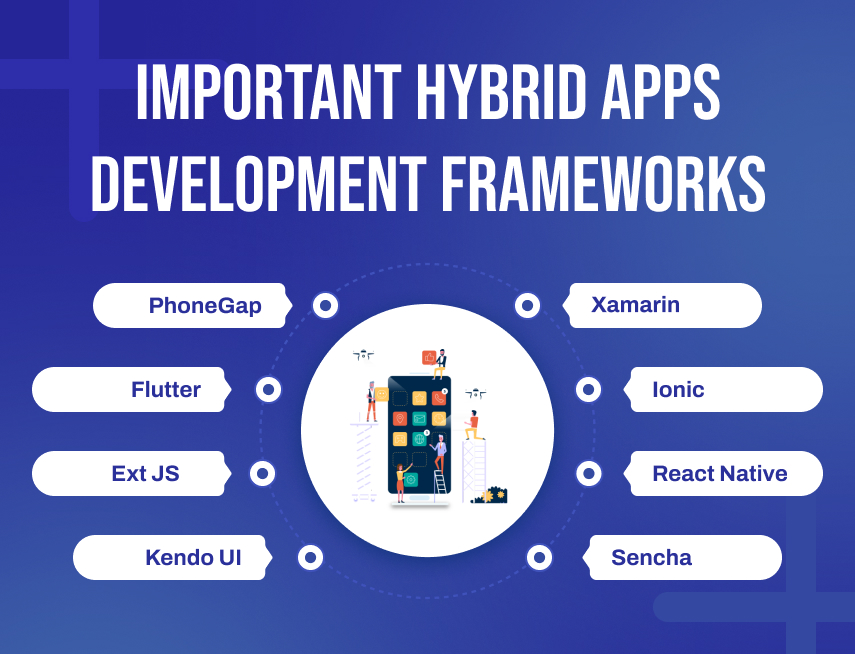8 Important Frameworks for Hybrid Apps Development
Hybrid app development or cross-platform mobile app development enables the creation of a business product that is functionally compatible across various operating systems and platforms such as Android and iOS. Developers use HTML and JavaScript programming languages for hybrid app development and then integrate with multiple platforms.
Important Hybrid Apps Development Frameworks
There are 20+ hybrid app development frameworks. We have handpicked a chosen few that are often used across our hybrid app development services.

1 Xamarin
Xamarin is an open-source Microsoft cross-platform mobile application framework that works with the .NET framework and C# programming under the MIT license of Visual Studio.
Due to the .NET and C# technology combination, 95% of the code is reusable on different platforms. Its app performance is comparable to other Java and Swift-C performances. The Xamarin ecosystem covers all the aspects of hybrid app development.
2 Ionic
Launched in 2013, it is one of the oldest hybrid app development frameworks. It is open-source, scalable, and easy to implement. Its excellent array of JavaScript, CSS, and HTML components helps developers to build interactive applications. Ionic follows a single codebase with impressive documentation. It depends on PhoneGap or Cordova wrappers to function like a native app.
3 React Native
Developed and launched by Facebook in 2013 as ReactJS, a web development platform, it transformed into a tool for hybrid app development when the React Native build was released in 2015. React Native is often the top choice for app developers. It uses the universal JavaScript language, and the source code can be converted into native elements, thereby enabling the native user experience. It provides excellent functionality using native device APIs, just like Xamarin does. React Native has a simpler UI, is cost-effective, and has excellent third-party support.
4 Sencha
Sencha or Sencha Touch is a comprehensive enterprise-grade hybrid apps development platform that focuses on building applications solely. Modern web technologies like HTML5, ES6, CSS, and JavaScript are used to build cross-platformed data-intensive web and mobile applications.
It supports Tizen apps, and Sencha Touch and Ext JS were merged to create the Sencha Ext JS with a set of tools to enhance interface productivity.
5 PhoneGap
In 2009, Nitobi created Apache Cordova, which was later acquired by Adobe in 2011 and renamed PhoneGap. The open-source hybrid apps development framework writes applications in JavaScript, CSS3, and HTML5.
The source code passes through a cloud compiler, as Adobe calls it, and generates the application. It has a simplified design interface and enables faster code development.
6 Ext JS
Product concepts that are extremely data-intensive are often built with enterprise-grade Ext JS for cross-platform compatibility and functionality. Companies like Cisco, Apple, Nvidia, and Adobe use the Ext JS hybrid apps development framework.
The framework enables the creation of high-performance apps with native experience and operability. Support for React and Angular is built-in, and there are tons of drag-and-drop HTML5 ready-to-use templates.
7 Flutter
Designed and released by Google specifically for Google Fuchsia, Flutter is an open-source user interface to create hybrid apps through a single unified codebase. Flutter functions with DART, its own programming language built with the combination of Kotlin and Java.
The Flutter hybrid apps development framework has unmatched cross-platform capability with impressive speed and seamless futuristic design elements.
8 Kendo UI
Kendo UI is powered by Progress Telerik; it has an extensive JavaScript UI component collection and has integrated React, Angular, Vue, and jQuery libraries for simplified hybrid app development.
It enables experienced development teams to build data-intensive scalable applications in a short time. It is an enterprise-grade framework on which companies like NASA and HP depend.
Also Read: How do Talabat App Work for Food Delivery?
Choosing a Hybrid App Development Framework
The choice of the ideal hybrid app development platform depends on:
Product idea – the structure and utility of the product determine the choice of the development framework.
Cost – the work doesn’t end with creating the hybrid app; continuous app support factors within the overall development cost.
Product security – while security is prioritized by every hybrid app development framework, it helps to understand specific security protocols of shortlisted app frameworks and then select the best-suited ones.
A technologically uninitiated person should depend on the good counsel of an IT consultant who can explain the pros and cons of various hybrid app development frameworks and accurately guide them toward the right solution.
In closing, hybrid apps are the future. The demand to develop multi-platform-enabled applications is constantly on the rise, and cross-platform mobile app development is the only viable solution.
Lucenta Solutions offers premium hybrid app development services through constant innovation and expertise. Our hybrid apps work across all platforms and are built with the latest technologies to perfection. The continuous support team ensures maximum testing for minimum performance errors. Contact us today.




